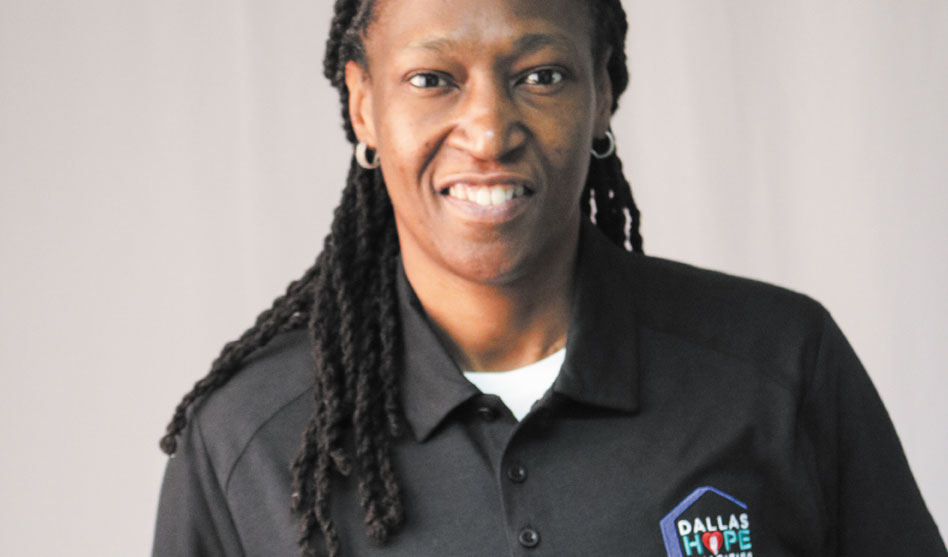Tamika Perry takes the helm at Dallas Hope Charities, taking the organization to a new level
DAVID TAFFET | Senior Staff Writer
taffet@dallasvoice.com
Tamika Perry, the new CEO of Dallas Hope Charities, says she is stepping into her new role with high hopes of expanding the organization’s services across North Texas. And she plans to put her experience working for the Chicago Housing Authority to good use in reaching her goals for DHC.
After graduating college, Perry moved to Chicago to begin her career in nonprofits. Recently, though, family brought Perry to Dallas.
She worked for Catholic Charities and Gilda’s Club in Chicago, but her focus shifted to housing when she assisted the Chicago Housing Authority by overseeing a staff of 30 working to get 1,600 residents ready to move into mixed income and voucher programs.
What she described happening in Chicago was similar to what happened to residents of a large Dallas Housing Authority project in Oak Lawn when it closed: Residents moved to better or newer housing in some cases, but rather than being located near jobs, they scattered across the city — some with better outcomes, some worse, mostly due to transportation issues, she said.
During the pandemic, the housing crisis only got worse, Perry said, noting the problem middle income families are having in finding affordable housing. And if middle-income families are having, problems, “What about lower income?” she asked.
Perry’s first job in Dallas was with Wellness Healthcare Solutions, where she dealt with housing for people with disabilities and handled case management involving issues like bathroom modifications.
Her next position was with Highland Park United Methodist Church as an impact coordinator monitoring housing partnerships with nonprofits like City Square and Austin Street Shelter.
But when the chance to work within the LGBTQ community arose, she jumped at the opportunity to join Dallas Hope Charities.
Dallas Hope Charities grew out of the charitable programs of Cathedral of Hope and was spun off into its own nonprofit in 2018. Among its core programs is Meals of Hope, which serves about 200 hot meals a day from a mobile food truck traveling to parts of the city that are food deserts.
With support from a number of churches across the area, the program has expanded to include a mobile food pantry.
Dallas Hope Center is a transitional living center for LGBTQ youth, ages 18 to 24, that opened in November 2020. That program has its roots in Cathedral of Hope as well, beginning when the church rented an apartment to house two homeless LGBTQ youth. Now DHC has its own property that can house as many as eight individuals for up to 12 months each.
The program wraps in a variety of services to guide youth toward independence. Counseling and social guidance are provided; so is transportation assistance. Each individual gets a cell phone so they can apply for jobs, set appointments and attend interviews.
As rents have skyrocketed in the Dallas area over the past couple of years, finding housing for homeless youth has become even more challenging. Perry said as youth in DHC’s housing program get jobs, they’re encouraged to save a portion of their income so they’ll have money to put down as a deposit. She said she encourages them to look for roommates and helps them apply for low-income housing.
The transitional living house is at capacity right now, giving eight youth a chance at a successful start in life as independent adults. But Perry is humbled by the enormous need. She said her waitlist of LGBTQ youth needing housing currently stands at 250.
Perry said most of the homeless LGBTQ youth she talks to tell her they are homeless because their parents asked them to move out.
Perry said she and her partner have been together 16 years and had planned to marry in March 2020, although the pandemic put those plans on hold. She said one way she tries to help the youth at Dallas Hope Center is by sharing her story and personal experience.
“I show them how healthy relationships can be done,” Perry said. “My partner encouraged me to get my masters degree.”
Then, she said, her partner took her shopping for “CEO clothes.”
And her partner is in education.
“She wears Dallas Hope Charities clothes to work because she’s so proud,” Perry said. “She believes I have the skill set to make a difference.”
Believing in each other is something Perry said she hopes the youth involved in her programs learn from her, so they can make a difference in each others lives.
Perry said partnering with other organizations that has enabled DHC to make an even bigger impact. In June 2020, DHC launched Collective Hope Coalition, aimed at eliminating suicide in the LGBTQ community in Dallas. She said the project is a coalition of more than 40 organizations that have come together to address the causes of suicide in the area.
This summer, DHC partnered with the Dallas Police Department to create the Safe Place program. Businesses displaying the Safe Place/Dallas Hope Charities sticker welcome someone in the LGBTQ community who is the victim of a hate crime or attack or robbery to report the crime and wait for police to respond.
Perry describes the program as just another way her organization can partner with others to make an impact and help keep the LGBTQ community safe.
Her plans for the future of the organization are simple: Meals? Expand them. Housing? Expand that across North Texas. LGBTQ youth are being thrown out of their homes everywhere, Perry reminds us, not just in the city.
Perry knows she and her organization are making a difference, and she’s confident that difference will grow.














